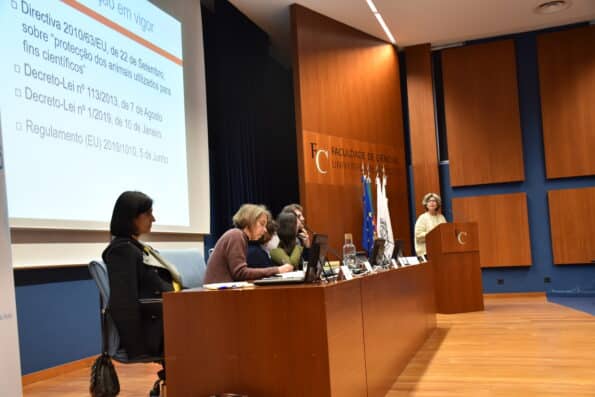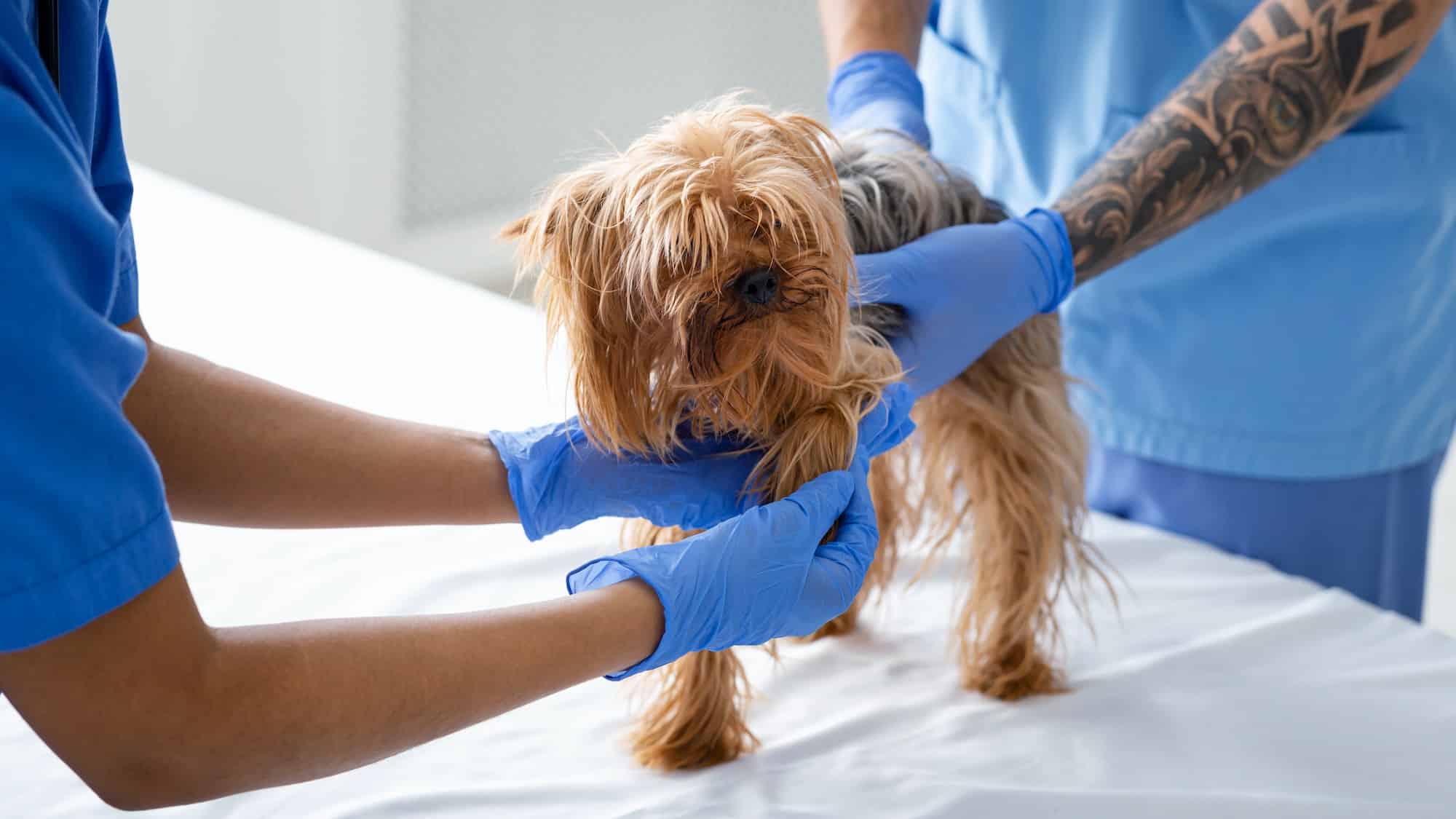At a time when there is talk of a “new era of science,” students and professionals in the area show increasing concern about animal experimentation. In a conversation promoted at the Faculty of Science, University of Porto, this Monday (13), experts discuss the replacement of the practice, reducing the use of animals and minimizing their suffering
Every year, thousands of animals are used for experiments. In parallel, it has been noticed a growing concern for animal welfare by the academic and scientific community. To talk about the subject, the Faculty of Sciences of the University of Porto (FCUP) hosted, last Monday (13), a debate organized by the Biochemistry Students Group of the Faculty of Sciences of the University of Porto (NEBQUP).
To analyze different perspectives, the panel brought together Inês Sousa Real, president of the Party of People, Animals and Nature (PAN), Anna Olsson, researcher and pioneer in the implementation of animal welfare in Portugal, Isabel Lopes, member of the Committee responsible for Animal Experimentation and Welfare of the Department of Biology, University of Aveiro, Nuno Franco, Vice-President of the Portuguese Society of Laboratory Animal Sciences, and Ana Paula Martins, senior technician in the Division of Animal Welfare of the Directorate General for Food and Veterinary (DGAV). Moderating was Paula Ferreira, member of the Monitoring Committee of the Animal Facility of the Institute of Biomedical Sciences Abel Salazar (ICBAS).
Issues such as the possibility of replacing this type of experimentation with non-animal methods, reducing the use of animals, and minimizing suffering during procedures were the most relevant topics on the table.
Despite the different views, there is one concept, mentioned by all speakers, with a unanimous favorable opinion – the application of the 3Rs Policy. This legislation incorporates commitments toReplacement of animals with alternative methods,Reduction of the number of animals, andRefinement, or improvement, of the procedures used in order to minimize suffering, pain, or lasting harm.
As for the substitution, Anna Olsson, explains that there is a tendency to think of the concept of animal experimentation in a too reductive way – that is, limiting it to what is done in laboratories for the sake of human health. Contrary to this myth, the researcher recalls that there are also experiments in which beings are objects of study for the good of their species.
In this regard, Olsson adds that by abolishing this method altogether, replacing it with alternatives with human cells or human volunteers, we may be neglecting some important areas in which animals are studied.
Isabel Lopes, who is currently working on risk assessment of chemical compounds in amphibians , recognizes that, for now, it is not possible to carry out research without using animals. The researcher tries, whenever possible, to return the amphibians to their habitat after the experimentation – but she regrets the lack of knowledge about these species on the part of veterinarians, who could help to return even more specimens to their environment.
The teacher points out, however, that with the development of alternative methodologies it can be expected that in the future the use of practice will be significantly reduced, even in this type of assessment.

Inês Sousa Real believes that there is a tendency to start from an “anthropocentric vision” and that one should “decentralize ethics“, because “we can’t forget that we are not alone“.
To reduce animal experimentation and, consequently, unjustified suffering, the PAN leader recalls alternatives such as encouraging the filming of procedures in order to facilitate the dissemination of knowledge and reduce the number of experiments. Moreover, she says that there should be a focus on public policies that allow investment in innovation and exploration of alternative in vitro and in silico models.
Nuno Franco was adamant about the need for animal experimentation, recalling the advances in medicine throughout history resulting from this practice. In his intervention, he mentioned the contribution that this practice has given to surgical procedures in humans, to anti-allergic drugs, to antibiotics, and to vaccines.
In this scope, the researcher mentioned, as an example, the use of animals for the production of the vaccines against Covid-19 that, according to him, saved the lives of about 20 million people. Despite relativizing the stress that certain procedures may cause to the animals, Nuno Franco attests that he and the researchers that use the same methodology take into account the regulations and try to cause them the least possible suffering.
The role of animals in science: “The current situation has the potential to be improved”
In 2022, European Commission released a report on the statistics of the use of animals for scientific purposes in the member states of the European Union and Norway during 2019. In Portugal alone, 79,447 animals were used in experiments in that period. Mice, rats, fish, guinea pigs, rabbits, dogs, cats, pigs, and amphibians are some of the most commonly used species.

Speaking to JPN, Anna Olsson said that animal experimentation “should not be a sine qua non [i.e., a mandatory condition] for entering a scientific career in biological research.”
The researcher assures that “the new age of science is a real debate in the scientific community“, taking into account that “knowledge can be achieved using many different methods” . And she points out: “The current situation has the potential to be improved.
On this subject, in statements to JPN, the PAN spokesperson stresses that, although research using animals has given “its contributions to science”, “we cannot forget at what price it happened“. Because there is a deeper knowledge of health and means to invest in different models, there is a “high responsibility” to leave the practice “behind”.
Animal protection begins in schools and extends to legislation
When questioned by JPN about the reliability of the regulation and supervision in force in the country, the president of PAN said that, in addition to a scarcityof means, we have “a very disperse and difficult to apply legislation.
Furthermore, Inês Sousa Real points out the lack of transparency in the area of research using animal experimentation: “A recent report by the European association that evaluates animal experimentation and animal welfare tells us that only 26% of faculties and researchers within the European Union disclose data in a transparent way,” she says.
The president of the PAN also suggested investing in other methods in education. “When we look at the faculties of veterinary medicine, we see that they continue to use companion animals to explain procedures to students”, she points out. She adds that these institutions “should now be serving as public hospitals”, allowing “learning supervised by teachers”, which preserves the educational aspect, without “unnecessary procedures”.

